#Douglas Hofstadter
Text
« Today’s AI technology allows people of different cultures to communicate instantly and effortlessly with one another. Wow! Isn’t that a centuries-long dream come true, weaving the world ever more tightly together? Isn’t it a wonderful miracle? Isn’t the soon-to-arrive world where everyone can effortlessly speak every language just glorious?
Some readers will certainly say “yes,” but I would say “no.” In fact, I see this looming scenario as a great tragedy. I see it as the beginning of the end of the age-old tradition of learning foreign languages [...]. The problem is that people of all cultures instinctively follow the path of least resistance.
Today’s young people [...] who grow up with translation software, will not be lured in the same way that I, as a teenager, was lured by the fantastic, surrealistic goal of internalizing another language. They won’t feel the slightest temptation to devote a major fraction of their lives to slowly and arduously acquiring the sounds, vocabulary, grammar, and cultural richness of another language. To them, someone with my self-punishing attitude would seem hopelessly wedded to the past. Why on earth cling to riding a horse or a bicycle for transportation, when you can drive a car (not to mention flying in an airplane)? [...]
[I]t strikes me as possible—in fact, quite likely—that humans are collectively going to knuckle under and throw in the towel as far as foreign languages are concerned. [...] As my friend David Moser put it, what may soon go down the drain forever, thanks to these new AI technologies, is the precious gift that one can gain only by immersing oneself deeply in another culture and thereby acquiring an entirely new set of ways of looking at the world. It’s a gift that can’t help but turn any human being into a far richer and broader one. But David fears that it may soon become as rare as hen’s teeth.
[...I]t’s incredibly depressing to contemplate the profound impoverishment of people’s mental and emotional lives that is looming just around every corner of the globe, thanks to the slick seductiveness of AI translation apps, insidiously creeping their way into ordinary people’s lives and sapping their desire to make other tongues their own.
When children first hear the sounds of another language, they can’t help but wonder: What in the world would it feel like to speak that language? Such eager childlike curiosity might seem universal and irrepressible. But what if that human curiosity is suddenly snuffed out forever by the onrushing tsunami of AI? When we collectively abandon the age-old challenge of learning the languages of other lands, when we relinquish that challenge to ultrarapid machines that have no inner life of their own but are able to give us fluent but fake facades in other languages, then we will have lost a major part of what it is to be human and alive. »
— Douglas Hofstadter, "Learn a Foreign Language Before It’s Too Late"
87 notes
·
View notes
Text
Perhaps the greatest contradiction in our lives, the hardest to handle, is the knowledge 'There was a time when I was not alive, and there will come a time when I am not alive.' On one level, when you 'step out of yourself' and see yourself as 'just another human being', it makes complete sense. But on another level, perhaps a deeper level, personal nonexistence makes no sense at all. All that we know is embedded inside our minds, and for all that to be absent from the universe is not comprehensible. This is a basic undeniable problem of life; perhaps it is the best metaphorical analogue of Gödel's Theorem. When you try to imagine your own nonexistence, you have to try to jump out of yourself, by mapping yourself onto someone else. You fool yourself into believing that you can import an outsider's view of yourself into you... though you may imagine that you have jumped out of yourself, you never can actually do so.
― Douglas Hofstadter, Gödel, Escher, Bach: An Eternal Golden Braid p 146 (1979
[Robert Scott Horton]
14 notes
·
View notes
Text






Books Read in July 2023
This month was crazy. I can't believe I read 8 books. True they were also shorties but I started 2 really huge books as well and made headway into them. WTF.
The House of Skin by Karina Lickorish Quinn
This is a really short novella (about 60 pages) that is a haunting gothic piece. A London artist is adopted by this family of patrons who bring her to their mansion to work. More of a mood vibe than anything. Really liked it.
I Am A Strange Loop by Douglas Hofstadter
This was Hofstadter making a stab at human consciousness and trying to explain what makes humans different from machines. I'm not sure it works fully but the ideas are interesting. The first third has a lot of math explanations I found confusing tbh so that was a bit of a slog to get through but I enjoyed it overall.
My Stupid Intentions by Bernardo Zannoni
Something about books about anthropomorphic animals just get me every time. This is about the exceptional life of a beech marten and is just absolutely soul crushing and beautiful. Pitch perfect, loved it.
Once There Were Wolves by Charlotte McConaghy
This was recommended to me by someone as the best book they read all year and, while I liked it while I was reading it, upon reflection it really falls apart and I hated it.
Part of it is about the rewilding of wolves in Scotland and part of it is a murder mystery following the lead character, a twin, and her sister who was abused so thoroughly she stopped talking. I found the abuse narrative like... shockingly dumb. I mentioned this on a book discussion forum I frequent and they mentioned lots of other books about the Scottish rewilding so I'm excited for that!
Fruit by Brian Francis
So I first heard of this when it came out around 2004 and it sounded interesting but it took me this long to read it! 19 years till I carved out time for this book during which it's become something of a modern Canadian classic.
This is about a little 8th grader in Sarnia who is fat and is struggling with his friendship and sexuality. Just pitch perfect and funny and heartbreaking. Hard recommend.
Bluebeard's Castle by Anna Biller
I got this as an ARC. I like Biller as a filmmaker and I was wondering how her unique style would work as a novel since her dialogue is so weird.
Oddly as it turned out. I feel like a lot of people are either going to hate this or not get it but while it's a very modern book her style of outright stating themes and blaring plot in neon lights is very reminiscent of early gothic works. Like 1700s gothic morality stuff. By the end I was won over by this so worth a shot imo.
Promise by Christi Nogle
Black Mirror-esque stories of worlds set in the near future. Like all short story collections this was mixed but there was plenty to enjoy and it left a favourable impression overall.
Blackouts by Justin Torres
I can't even explain this book except to say it's pretty brilliant. Even though I read an ARC of this I think I'm going to buy it.
It's fictionalized history and reminded me a bit of Autobiography of X even though it's about real people. I loved it though. Highly recommend.
#The House of Skin#Karina Lickorish Quinn#I Am A Strange Loop#Douglas Hofstadter#My Stupid Intentions#Bernardo Zannoni#Fruit#Brian Francis#Bluebeard's Castle#Anna Biller#Promise#Christi Nogle#Blackouts#Justin Torres#currently reading
7 notes
·
View notes
Text
I would say that that text, in sharp contrast to what I myself wrote in the book’s 20th-anniversary preface, consists only in generic platitudes and fluffy handwaving.
The prose has virtually nothing in common with my writing style and what it says does not agree at all with the actual story that underlies the book’s genesis.
…
The text is a travesty from top to bottom.
Douglas Hofstadter, whose book Gödel, Escher, Bach inspired a generation of students to study computer science, is not impressed when GPT-4 pretends to be him.
Personally, I think this iteration of artificial intelligence (repackaging scraped text into clouds of bullshit) is garbage and hope the mania over it collapses like the crypto bubble did.
#Douglas Hofstadter#Godel Escher Bach#Gödel Escher Bach#AI#artificial intelligence#LLM#large language model#ChatGPT#GPT-4#GPT
6 notes
·
View notes
Text
LOI DE HOFSTADTER (ou loi de glissement de planning)
"Ça prend toujours plus de temps qu'on ne le pense, même en tenant compte de la loi de Hofstadter."
Découverte par le mathématicien et philosophe américain Douglas Hofstadter (né en 1945), empiriquement vérifiable en nombre de domaines (difficulté de la planification - même en anticipant - dans le domaine de la recherche et du développement), cette loi semble avoir un champ d'application quasi infini.
2 notes
·
View notes
Text
i've been eagerly awaiting douglas hofstadter weighing in on this whole "ai" thing and that day has finally come <3
2 notes
·
View notes
Text
“We are all curious collages, weird little planetoids that grow by accreting other people’s habits and ideas and styles and tics and jokes and phrases and tunes and hopes and fears as if they were meteorites that came soaring out of the blue, collided with us, and stuck. What at first is an artificial, alien mannerism slowly fuses into the stuff of our self, like wax melting in the sun, and gradually becomes as much a part of us as ever it was of someone else (though that person may very well have borrowed it from someone else to begin with).” -Douglas Hofstadter
10 notes
·
View notes
Photo
Douglas Hofstadter, Gödel, Escher, Bach
***
The first aspect of Star that I want to consider is the cybernetics contained in it. Let us transcribe Star into the more convenient form of “network/trees constituting the network.”
This is pictured in Fig. 1. On one side (by convention the left) we see a network or mesh of interaction. These are left unspecified: the nodes could be anything at all (molecules, species, concepts, …), and their interconnecting, arrows could be any processes whatsoever (computations rearrangements, transformations, …).
It is assumed that any node could be seen (at: another time, by somebody else) as another network, the initial net could be seen as a node in a larger net. That is: there are no initial or final “elements”; everywhere we led everything has the same meshy appearance. On the right side of Fig. 1 there is a tree of root a in which I have, step by step, drawn the nodes to which a connects, the nodes to which those nodes connect in turn and so on. Had I continued to do this, I would have come back, after a while, to write a again. Thus- the process could go on forever (whence the “…”).
The stages of this procedure are conveniently tracked by 1, 2, 3, …, to indicate the successive depth of the tree.
The way to go from left to right in Fig. 1 is: chop (prune, truncate) at a. That is: take a as if it were an initial element, and proceed as if the time at which this done is zero time. Please note that the act of chopping demands somebody who does it, and sometime to do it. The way to go from right to left is more tricky, hence usually disregarded. If we go down the tree we would pass through the net components once and again, but this is never the initial net, it is still a tree branching and branching.
We can’t get back to the initial net in time. So we must do it by eliminating time, i.e., in eternity. That is: we take this recursion in infinity (a limit process, a leap beyond the time-bound steps). The net re-appears as a fixed point (eigensolution) of this repetitive process.
Thus any finite, time-wise study of the net’s tree is an approximation to the net as a totality. Example: consider the feedback circuit of Fig. 2. In the usual description of it, we start with some initial response x(t0), and then consider what happens at x(t0 + ∆t), and successively at x(t0 + n∆t) (with ∆t perhaps very “small,” infinitesimal). This is depicted below in Fig. 2, in the series 1, 2, 3,.. Consider now this series of cycles around the circuit in contrast with the entire circuit itself. Note first that from the completed circuit one can generate the infinite series of cycles by chopping it at x at some t0, and taking some b as given. Note that this circling around and around will never be different from that; the total circuit will not appear. Thus at some time we stop, we have to stop. But if we take a limit through infinity the circuit is again closed. Thus what we actually do is an approximation, for as much time, and as close as we can get, to the simultaneity suggested in the graphic representation (it looks closed doesn’t it?). But these two things are surely different. By contrast, the circuit’s stability is a timeless property and can be taken as one possible description of the whole system, of its simultaneity, of its closure...
...Thus the net/tree duality is explicitly connected by processes in both directions. We make sense of the Timeless (simultaneous) net by dealing with it in time, Piecemeal. We make sense of the part-by-part approximation of the trees in the net by seeing how they lead to the stability of a simultaneous total system. Hence the pair net/trees is of the form Star *: the it (the net)/the processes leading to it (the trees)...
...In each case the dual elements become effectively complementary: they mutually specify each other. There is no more duality in the sense that they are effectively related; we can contemplate these dual pairs from a metalevel where they become a cognitive unity, a second-order whole.
Note that this superation of duality is no “synthesis” (in the hegelian sense), since there is really nothing “new,” but just a more direct appraisal of how things are put together and related. (The closest I have come to finding a philosophical lineage of this view of dualities, is the Law of Three in the sufi tradition, or the buddhist doctrine of the middle way. There is in both a practice of balance, neglecting nothing, yet in the middle of whatever is going on. It should be more accurately be called the Law of Zero, since every-thing stays just the same.)...
...For every hegelian pair of the form a/not-A there exists a more inclusive Star, where the apparent opposites are components of the right hand side. Another way of saying the same thing is: in hegelian dialectics dual interactions are of the zero-sum form: what one side gets the other side loses. The operational form of interactions seems almost universally to be of zero sum form: every participant can win (by playing the game of the whole).
– Francisco Varela, “Not One, Not Two” (x)
#darkness shining in brightness which brightness could not comprehend#each thing diametrically opposed to itself#dendritic#light/dark#douglas hofstadter#gödel escher bach#become the prey of zero#dialectics#francisco varela#not one not two#limits#negative space
9 notes
·
View notes
Text

January JOMP Day 16: Forever On Your TBR
Most of these I have been trying to read for over twenty years.
2 notes
·
View notes
Photo

2 notes
·
View notes
Text

"Quando il tempo è maturo per certe cose, queste appaiono in diversi luoghi, proprio come le violette sbocciano dappertutto quando comincia la primavera."
– Farkas Bolyai
2 notes
·
View notes
Text
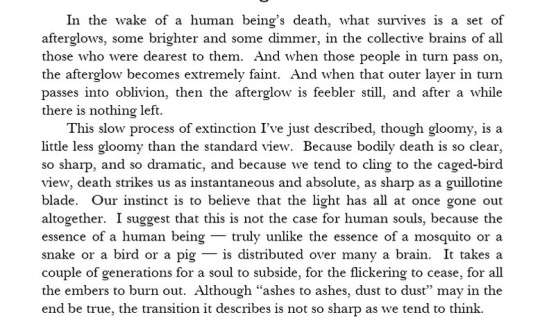

5 notes
·
View notes
Photo

(Art: 'Music', 1903 by Antonina Leonardov Rzhevskaya)
* * * *
Why is some music so much deeper and more beautiful than other music? It is because form, in music, is expressive–expressive to some strange subconscious regions of our minds. The sounds of music do not refer to serfs or city-states, but they do trigger clouds of emotion in our innermost selves; in that sense musical meaning IS dependent on intangible links from symbols to things in the world–those 'things', in this case, being secret software structures in our minds.
~Douglas Hofstadter
[Philo Thoughts]
(Book: Gödel, Escher, Bach: An Eternal Golden Braid)
22 notes
·
View notes
Quote
The point is just that this rule shows how one can mechanically shunt symbols and ignore meanings, and yet preserve truth while doing so.
I Am a Strange Loop, Douglas Hofstadter
6 notes
·
View notes
Quote
"Hofstadter's Law: It always takes longer than you expect, even when you take into account Hofstadter's Law."
Douglas Hofstadter, professor of cognitive science (b. 15 February 1945)
3 notes
·
View notes
Text
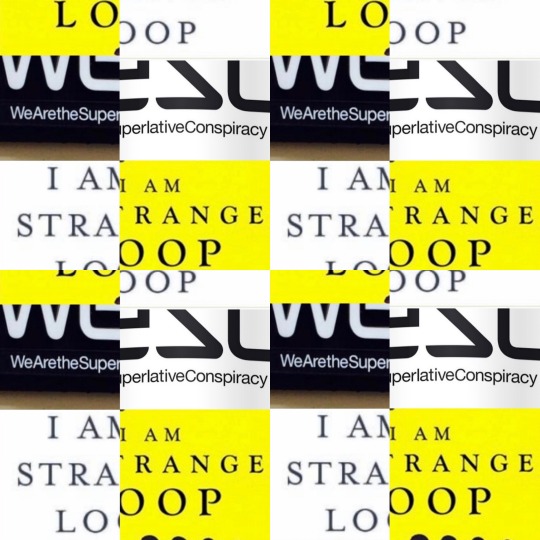
I am a strange loop/ We are the superlative conspiracy
0 notes